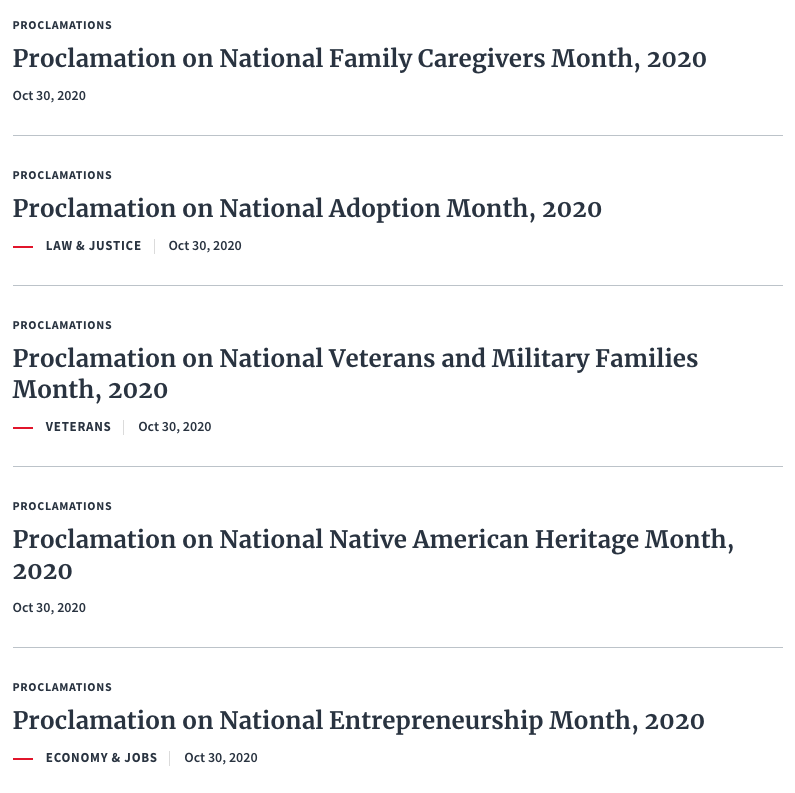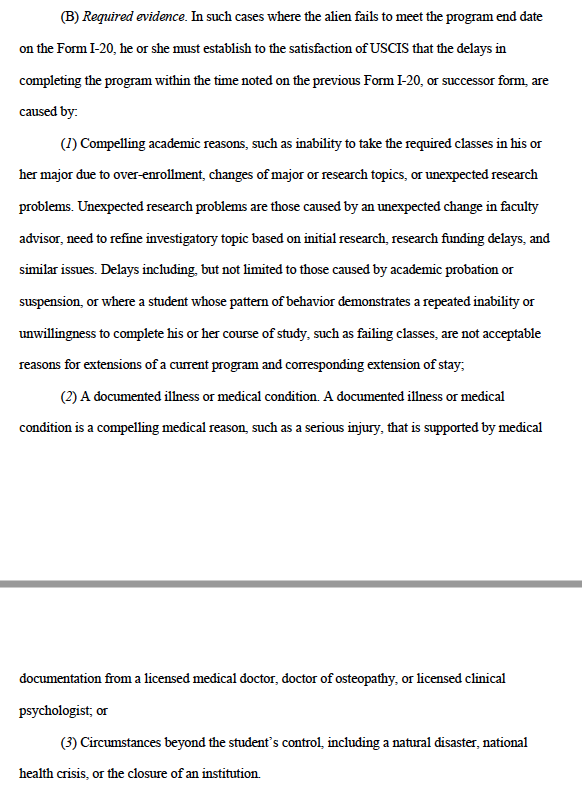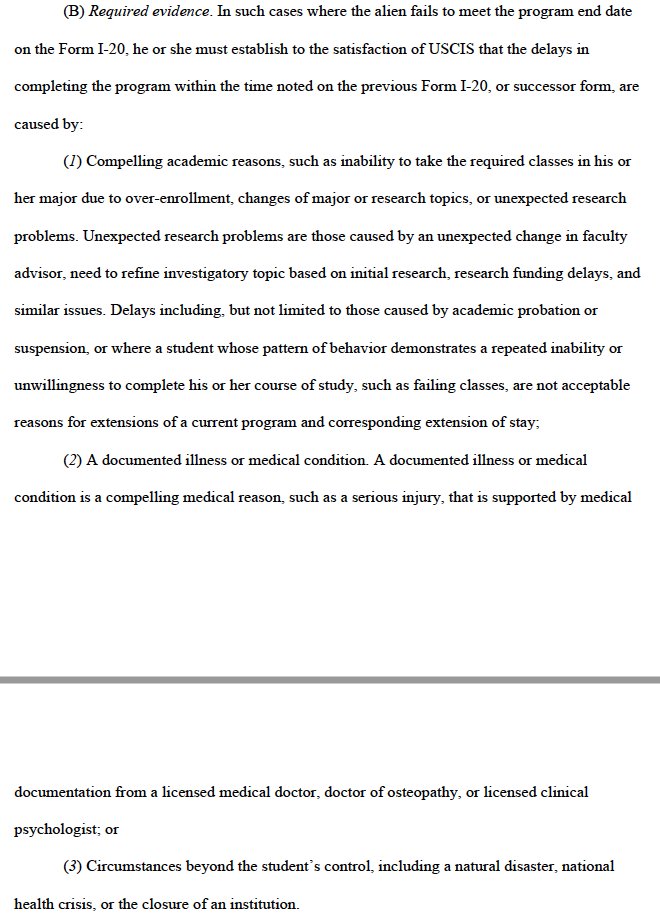
At last! Instead of poring over Trump's regulatory agenda for new outrages, I present to you an overview of how the Biden administration can reverse it all.
Trump has made >400 changes to the immigration system without Congress, per @MigrationPolicy.
1/
migrationpolicy.org/research/us-im…
Trump has made >400 changes to the immigration system without Congress, per @MigrationPolicy.
1/
migrationpolicy.org/research/us-im…
All of these changes are "executive actions." That's a catch-all term for anything done by the executive branch, including:
*Executive Orders (a specific kind of White House doc)
*Regulations
*Policy memos
*Other subregulatory actions
Some are easy to rescind; others not.
2/
*Executive Orders (a specific kind of White House doc)
*Regulations
*Policy memos
*Other subregulatory actions
Some are easy to rescind; others not.
2/
Let's start where Trump started: Presidential Proclamations.
The vast majority of them are purely symbolic, bestowing honorifics on various months of the year.
There's at least one big exception, though, as we all learned the hard way in January 2017...
3/
The vast majority of them are purely symbolic, bestowing honorifics on various months of the year.
There's at least one big exception, though, as we all learned the hard way in January 2017...
3/

Section 212(f) of the Immigration and Nationality Act directly authorizes the President—not the DHS Secretary or Secretary of State—to issue a proclamation to "impose on the entry of aliens any restrictions he may deem to be appropriate."
4/
reuters.com/article/us-usa…
4/
reuters.com/article/us-usa…
No president has ever used these proclamations as frequently or aggressively as Trump:
*Muslim bans (including spouses & children of US citizens)
*Immigrant visa bans (including spouses & children of permanent residents)
*Work visa bans
*And many more
5/
crsreports.congress.gov/product/pdf/LS…
*Muslim bans (including spouses & children of US citizens)
*Immigrant visa bans (including spouses & children of permanent residents)
*Work visa bans
*And many more
5/
crsreports.congress.gov/product/pdf/LS…
A new president can rescind these entry ban proclamations with the stroke of a pen—the rare instance of a self-executing action by the President alone.
And Biden has promised to immediately rescind the Muslim bans.
7/
joebiden.com/immigration/
And Biden has promised to immediately rescind the Muslim bans.
7/
joebiden.com/immigration/
Trump has also issued many "Executive Orders" & "Presidential Memoranda." (No real difference, legally.)
You may be surprised that these are largely symbolic. They're not self-executing. They are literally memos from the President to the Cabinet, who make the actual changes.
8/
You may be surprised that these are largely symbolic. They're not self-executing. They are literally memos from the President to the Cabinet, who make the actual changes.
8/
Any Executive Order or Presidential Memorandum signed by Trump can be easily rescinded by Biden.
But that's not enough to make a difference.
You have to go deeper, to the agency level, where the policy is actually implemented...
9/
usatoday.com/story/news/pol…
But that's not enough to make a difference.
You have to go deeper, to the agency level, where the policy is actually implemented...
9/
usatoday.com/story/news/pol…
It's the agencies that issue regulations (aka "rules"), which are laws created by the executive branch.
Regs take a long time to implement or rescind, thanks to the Administrative Procedure Act (APA)—the rules for making rules, laid down by Congress.
10/
fas.org/sgp/crs/misc/R…
Regs take a long time to implement or rescind, thanks to the Administrative Procedure Act (APA)—the rules for making rules, laid down by Congress.
10/
fas.org/sgp/crs/misc/R…
Normally, a small army of policy experts, lawyers, & economists goes through this process:
Proposed rule ➡️ Public comments ➡️ Final rule
This often takes a year or more.
Do it sloppily, & it's more likely a court will strike it down. Biden's team won't want to be sloppy.
11/
Proposed rule ➡️ Public comments ➡️ Final rule
This often takes a year or more.
Do it sloppily, & it's more likely a court will strike it down. Biden's team won't want to be sloppy.
11/
So the race is on: Any regulation the Trump admin can finalize by Jan 20, 2021 will have to be rescinded by a whole 'nother regulation, which could take a long time to get done.
Prepare for an onslaught of "midnight regulations"...
12/
Prepare for an onslaught of "midnight regulations"...
12/
There are two shortcuts to kill a reg:
1) Congress can do it via the Congressional Review Act (CRA), but don't count on that with a GOP Senate.
2) Courts can do it, vacating the reg as unlawful—& a new administration can drop the appeal.
13/
nytimes.com/2020/11/02/us/…
1) Congress can do it via the Congressional Review Act (CRA), but don't count on that with a GOP Senate.
2) Courts can do it, vacating the reg as unlawful—& a new administration can drop the appeal.
13/
nytimes.com/2020/11/02/us/…
There's also a shortcut to issue a reg, which the Trump admin is relying on more & more as the final hour approaches:
"Interim Final Rules" skip the public comment phase by citing some alleged "good cause."
Many will die in litigation.
14/
forbes.com/sites/stuartan…
"Interim Final Rules" skip the public comment phase by citing some alleged "good cause."
Many will die in litigation.
14/
forbes.com/sites/stuartan…
Without a doubt, the Trump admin will run out of time to implement the full monty of its immigration regs.
Anything that's still a "proposed rule" by 1/20/2021 can just be ignored by Team Biden—it was never law to begin with.
But wait, there's more!
15/
Anything that's still a "proposed rule" by 1/20/2021 can just be ignored by Team Biden—it was never law to begin with.
But wait, there's more!
15/
There's a huge number of sub-regulatory actions that don't go through the regulatory process—policy guidance, prosecutorial priorities, etc.
These are supposed to be interpretations of existing laws, not new laws themselves.
They can be issued quickly & reversed quickly.
16/
These are supposed to be interpretations of existing laws, not new laws themselves.
They can be issued quickly & reversed quickly.
16/
For example, I dare say the Biden administration will revoke & replace the DHS policy of rejecting any application for U visas by victims of domestic violence & other crimes if they don't write "N/A" in every last blank space.
17/
washingtonpost.com/opinions/the-t…
17/
washingtonpost.com/opinions/the-t…
DACA is a special case. It was never a regulation—it's an exercise of prosecutorial discretion by the DHS Secretary. Obama turned it on, Trump tried to turn it off, & Biden can turn it back on again per SCOTUS orders.
It would withstand litigation better as a regulation.
18/
It would withstand litigation better as a regulation.
18/
Speaking of litigation—Republican state attorneys-general will likely sue to block the Biden administration from rescinding some Trump-era regulations.
So will the anti-immigrant litigation group @IRLILaw, which is staffed & bankrolled by xenophobes.
19/
motherjones.com/politics/2018/…
So will the anti-immigrant litigation group @IRLILaw, which is staffed & bankrolled by xenophobes.
19/
motherjones.com/politics/2018/…
The Trump administration will deliver a unique challenge to the Biden team, too—who knows how many opaque agency policy changes were never disclosed to the public?
e.g. There's no official DHS memo to deny visas to Nobel laureates, but it's happening.
20/
motherjones.com/politics/2020/…
e.g. There's no official DHS memo to deny visas to Nobel laureates, but it's happening.
20/
motherjones.com/politics/2020/…
TL;DR: Trump accomplished none of his immigration agenda in Congress, so Team Biden can unilaterally reverse all of his executive actions.
It's just going to be complicated & time-consuming, sucking up resources better spent on implementing an affirmative Biden agenda.
21/
It's just going to be complicated & time-consuming, sucking up resources better spent on implementing an affirmative Biden agenda.
21/
Here's an immigration regulation tracker from @chooseboundless, which I expect we'll need to update frequently between now and Inauguration Day...
22/22
boundless.com/blog/how-long-…
22/22
boundless.com/blog/how-long-…
• • •
Missing some Tweet in this thread? You can try to
force a refresh











